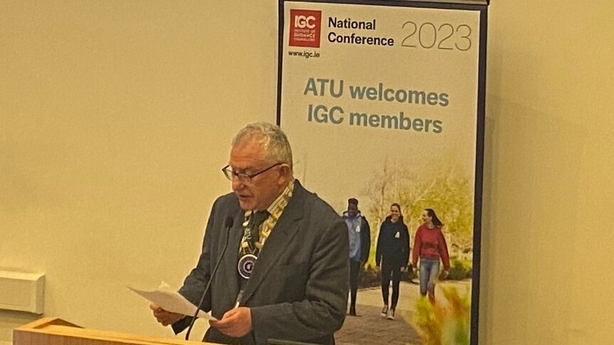For the last 35 years and more, Dr Richard Brennan has been the GP for Ballyhale and nearby Stoneyford in south Kilkenny, covering an area of up to 200 square miles along with one other colleague further south towards the Waterford border in Mullinavat.
Now Dr Brennan is, as he puts it himself, "90% retired".
In his own case, he is hopeful that his two doctor sons will carry on the tradition of providing healthcare services to generations of local people in the catchment area that has become their own.
But he, and others in similar positions, worry about the future of general practice in rural areas and about whether or not young doctors will be attracted to come to work in places like Ballyhale, Stoneyford, Mullinavat, and their counterparts across the country.
"It's a very general rural practice, fantastic community spirit," Dr Brennan says of the place he calls home.
"We covered everything from general health right through to farm accidents, road traffic accidents, first responders... So I'm part of the community but the community is part of me as well."
He says he has always been a strong advocate of rural GP services but points out that 25% of the population of this country, who live in rural areas, have just 15% of GPs working for them.
"The first places to feel it [shortages] are always rural areas because you can't hide the fact that there is a doctor shortage or that there is no doctor available," he said.
Dr Brennan said he is been urging politicians, for 10 years, to put more support services and infrastructure in place for GPs.
"I think a lot of GPs, especially older GPs, found the Covid experience and the surge in workload post-Covid extremely busy, demanding and tiring.
"Medicine is a profession in which you need to be both physically and mentally on top of your game. It's become complex, it's no longer simple, and the range of topics you need to have a knowledge about is incredibly wide at the moment."
Other practices who have vacancies arising are finding it "extremely difficult" to replace retiring doctors, while his own needs more support in terms of infrastructure.
"The team-care is extremely important, to deliver the quantity of service and the variety of service we need to provide, but ultimately the person who takes on the service is the GP."
"The options we were looking at in discussions with some of my colleagues were really, 'Would we just retire?' and were there options about corporate practices and entities taking over the practices, but at this stage most of the corporate practices won't come into rural practices. They want to look at urban centres."
We need your consent to load this rte-player contentWe use rte-player to manage extra content that can set cookies on your device and collect data about your activity. Please review their details and accept them to load the content.Manage Preferences
He feels that if young doctors and medical students can get experience of rural general practice, they will get an appreciation of how worthwhile and enjoyable the job is.
"The problem is, if you don't have enough GPs or you have no GPs, it's an eco-system. Healthcare is an eco-system. If there's a deficit of GPs or GPs are too busy, the workload ultimately ends up with A&E departments."
The Irish College of General Practitioners says there is a "major shortage" of GPs across the country, particularly in rural areas.
"This makes it increasingly difficult for patients to get timely access to a GP and to see a GP when they are unwell," says Dr Diarmuid Quinlan, who is a GP in Glanmire in Cork and medical director of the ICGP.
There are 600 GPs in Ireland who are at retirement age, he said, while the workload has increased substantially.
"The Irish College of GPs, the HSE and the Department of Health are working together very well, very constructively to address the shortage of GPs," Dr Quinlan added, with more GP training places under expansion.
"We also would like a sense of urgency in the strategic review of general practice by the Department of Health."
The HSE says it is working closely with the ICGP, and other interested parties, and has a range of measures in place to boost the GP workforce.
These include providing more training places for new GPs, attracting doctors from non-EU countries to join general practices in rural Ireland, and a rural fellowship scheme funded by the HSE to try to address gaps in practices.

Speaking about GP shortages in rural areas, Dr Tadgh Crowley, Chair of the Irish Medical Organisation's GP Committee told RTÉ's Six One that it's a perfect health storm in terms of GP replacement.
"GPs are getting older and we don’t get the number of GPs to replace them behind.. there is a huge amount of work coming at us - obesity and chronic disease.. we are struggling to get GPs to come on board".
He said that there was also the issue of retaining GPs in the country once they are qualified.
Dr Crowley added that there had been a lack of a workforce plan, but also pointed to the expense of medical training and trying to set up in areas to have enough work.
When housing is taking into account young doctors can find themselves in serious debt before even starting up at all, he said, with it difficult to even find a place to rent in some areas.






